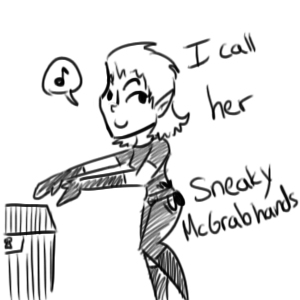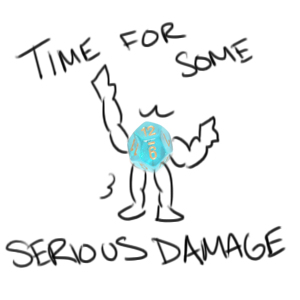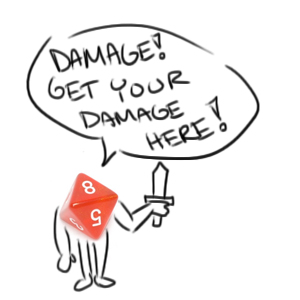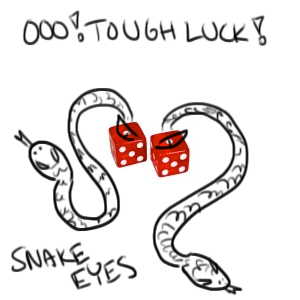Other than the pencil, paper, rulebook and your imagination, Dungeons and Dragons requires a set of special dice to play the game. Many argue that your dice are among the most important tools when playing as they can mean life or death for a character. It’s not uncommon for a player to “test” dice before they buy them, simply rolling them a number or times to see if they favor high or low rolls. Some players even buy entirely new dice sets for each character, not wanting to “taint” dice with a previous character’s actions and personality. There are many superstitions regarding dnd dice as so much hangs in the balance for each roll. Some players refuse to use certain color dice or mix different dice sets together. If a die is being particularly unlucky that day, a player may forsake it for the rest of the game or hide it away somewhere so the bad luck doesn’t carry to other dice.
And thus the d8 was never seen again…
Dice are rolled whenever you attempt an action, be it swinging a sword at someone or sneaking past a guard. The result of your roll is then added to or subtracted from depending on your character’s strengths and weaknesses. If you are a small, frail person and try to wield a broadsword in combat, you can expect to face some negatives to your final result. This isn’t to say you won’t succeed, but the odds are against you.
Somehow I doubt this will end well.
Not all dice rolls are in relation to combat as skills are also important. Lets say you’re playing a thief character. You’ve spent your entire life on the streets, fighting for survival and stealing what you need (or what you want ;)). When attempting to pick pocket, you add your “Sleight of Hand” skill ranks onto your dice roll to increase your chances for success. Sleight of Hand is a skill that is used for underhanded means, such as stealing or cheating at a card game. It makes sense that your character, a thief, would have points in that skill. When creating a character you are given a certain amount of skill points per level that you allocate based off of your character’s backstory/experiences as well as the role you want to play in the group. Having a person with the ability to pick locks as well as pockets can serve a group well.
Sneaky McGrabhands was always the first suspect when something went missing…
Now then, I’ve spoken briefly on the dice and some of the things they are influenced by. I bet you’re wondering what makes up a “dice set” for Dungeons and Dragons. A normal set comes with a d20, d12, two d10 , d8, d6, and d4. The d stands for die, the singular of dice, and the number after stands for the number of sides it has. For example a d20 is a die with twenty sides. Read below for what each of the dice are used for:
d20
With great power comes…
This is your life blood. The d20 is the most influential die of the game and is used whenever you need to achieve something: it is your action dice. Above I talked about wielding a weapon and using a skill, both of these would be accomplished with a d20. Whenever you decide to have your character do something, you better have a d20 in hand and be ready to roll. There are two special numbers on a d20 that usually do not follow the adding or subtraction rule which depend on your character’s composition. These are the “natural one” and “natural twenty”. The natural portion says that this is the number rolled without anything influencing it, and can mean grand success or miserable failure. Rolling a natural one means that your character completely fails at doing something to the point of additional misfortune. In combat, a natural one will allow your opponent an extra swing at you as you fumble your weapon or snap your bow string. While using a skill, such as Sleight of Hand, you could accidentally slip and fall on your intended victim, or have a random guard walking by take notice of you.
On the other side of this is the coveted natural twenty. The natural twenty is the meaning of epic and can occur just as often as a natural one. Imagine if you will your character, a holy knight of a deity which is fighting off a vile demon. The knight is at their final breath, the demon ready to devour you when suddenly a light is cast down from the heavens, you feel divine strength surging in your veins and find the will to go in for the final blow. The demon is slain and all will tell stories of your triumphant battle. Pretty sweet deal, right?
The d20 is the fickle mistress of your dice. So much depends on this die that you can almost understand someone rolling dozens of dice before finding the perfect one.
d12
Come at me bro!
This die is normally used for spells or weapons that deal a d12 damage. Not as spectacular as a d20, but when deciding on damage it can play a major role. Unfortunately, in Dungeons and Dragons a d12 isn’t used for much else. In other roleplay games, a d12 is used for things such as determining which body part a weapon hits.
d10/percentile
And you find a rusty sword. Enjoy.
I mentioned previously that you get two d10s in a set. This is because one d10 is marked one through ten, usually called the d10, and the other is marked ten through one hundred in intervals of ten (ie: 10,20,30…), called a percentile. The d10 is another damage determiner, like the d12. Combined with a percentile, the d10 is used as a singular digit marker. Say you roll a percentile and a d10. The percentile lands on 80 and the d10 lands on 5. Your total would then be 85. In this way, these two dice are used for percentages for loot tables or chance tables. Loot tables list treasure that can be found in that chest your character just lock picked. The higher the number, the better the outcome (usually). Chance tables go along with certain spell outcomes. When you get higher level spells, they become more powerful but also more dangerous. You could end up sending someone to another plane of existence (ie: hell) accidentally if your chance roll is low. Like the d20, getting a total of one or one hundred can be used as epic success or epic failure. When determining loot, a one hundred can turn that magic sword into a magic artifact of lost knowledge.
d8
I’ll take a d8 damage, thank you sir.
There are a lot of damage deciders in Dungeons and Dragons, as the d8 falls into the same category as the d12 and d10. This goes along with a weaker weapon/spell than the other two damage dice. Why so many dice for calculating damage? This allows for more flavor in combat and weapon choice, and to show that some things have a capacity for higher damage than others.
d6
Looks like you lost all your money. What a shame.
The most commonly known die type as its used in most other types of games and gambling activities. The d6 is used for damage (getting repetitive huh?), but also to simulate local tavern gambling. The average tavern you explore will probably have some dice games in it, which your character can engage in. The six sided die is the most common tool in these games and often associated with luck.
d4
You take d4 damage… to your foot.
The d4 is known as the caltrop die because it is the most damaging die… to your feet! Stepping on a d4 is a pain that is akin to stepping on a lego brick. This die is yet another damage determiner, but can also be used for determining turn order or compass directions. In our group, the d4 is commonly used for choosing who is attacked by certain monster’s abilities, to make it fair and unbiased.
So there you have it, all the dice you’ll need during your first Dungeons and Dragons session. Which die is most interesting to you?









Bill Said:
on October 18, 2011 at 12:29 pm
I hate d4’s or Caltrop’s as we used to call them, they are so evil. I cannot count the times that someone has left one on the floor( or they have fallen there) and right in the middle of the night when i am rushing for something… Bam! right in the center of the foot. they always find the tender spot…beware.
Liz Said:
on October 18, 2011 at 9:03 pm
I agree about picking the right dice set, because you don’t want to die. –_–
alwaystwinning Said:
on October 20, 2011 at 3:12 pm
I never knew how much of an in-depth process it is to choose a pair of dice. Your post is so well detailed I caught myself wanting to go buy dice just so I can try out this process and maybe even try to play the game (although I would probably fail at it miserably). The little sketches you provide really keep the readers attention if they were to get side tracked,
dmlore1 Said:
on October 27, 2011 at 4:34 pm
I myself have never played dungeons and dragons, and have never even really read about it. I also find that within my small high school, I hadn’t even heard of anyone playing it, but it seems like an interesting complex game. Again, your pictures add to your blogs significantly giving readers an understanding of what your trying to say.
getbananas Said:
on November 14, 2011 at 5:09 pm
I found myself laughing when I read about how superstitious people get about dye. Not because I found it ridiculous. But because I am ABSOLUTELY SURE that I would be one of those people. I am extremely superstitious about every single thing possible. I HATE Friday the 13th. If someone spills salt I FREAK out and throw salt over my right shoulder for a month. I never pick a penny tails up…and so on and so forth.
So I know I would be like that. And that revelation just made me laugh.